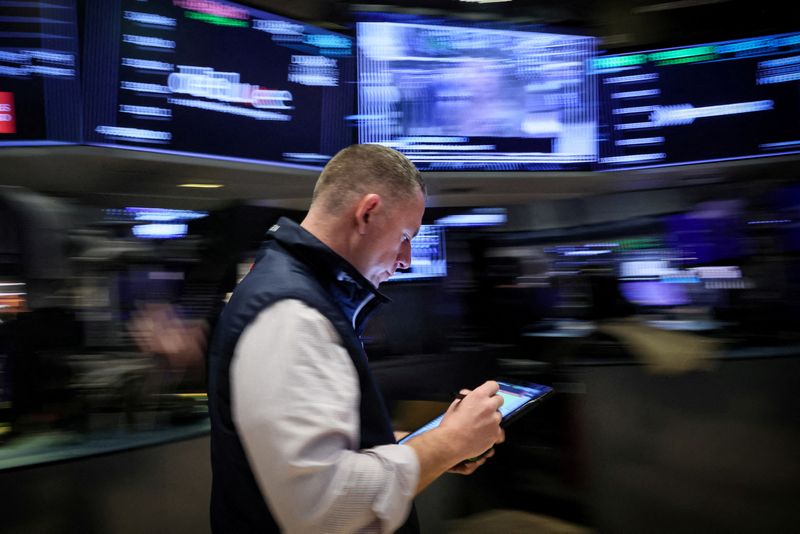Wall St pauses ahead of Jackson Hole, snapping multi-session rally
By Stephen Culp
NEW YORK (Reuters) -U.S. stocks broke their recent rally on Tuesday, consolidating amid few market-moving catalysts ahead of the Jackson Hole Economic Symposium, set to get under way on Thursday.
All three major U.S. stock indexes were modestly lower, setting a course to snap a multi-session rally in which the equities market bounced back from a steep sell-off driven by inflation fears.
"(The market is) taking a breather," said Joseph Sroka, chief investment officer at NovaPoint in Atlanta. "It's nice to have a calm day for once, and the market has recovered from a bit of a shock to the system following the weak July jobs report, which sparked concern that maybe the Fed missed the boat, it was too slow to cut rates."
The eight days of consecutive daily gains were the longest winning streaks for the S&P 500 and the Nasdaq since November and December, respectively.
A 1.2% drop in semiconductor stocks pulled the tech-laden Nasdaq down the most.
On Thursday, representatives from central banks around the globe are expected to converge in Jackson Hole for their annual Economic Symposium, at which U.S. Federal Reserve Chair Jerome Powell is expected to deliver remarks on Friday.
Powell's speech will be parsed by market participants for hints regarding the number and timing of expected policy rate cuts this year and next.
"Jackson Hole speeches are traditionally optimistic, not to the point where (Powell is) going to announce any policy direction," Sroka added. "But maybe he will show some confidence that if the data continues to move in the right direction, then it would be appropriate to consider easing monetary policy."
Financial markets are currently pricing in a 71.5% likelihood of a 25 basis-point reduction of the Fed funds target rate at the conclusion of the Federal Open Markets Committee meeting in September, with a 28.5% chance of a super-sized cut of 50 basis points, according to CME's FedWatch tool.
On Wednesday, the Labor Department is expected to release its preliminary benchmark revisions to its employment data for the 12 months through March. A significant downward revision to the data could potentially affect the data-dependent Fed's policy path.
The Democratic National Convention in Chicago enters its second day on Tuesday as election-year tensions potentially exacerbate market swings at a time when the light volume typical of late summer trading can trigger market volatility.
At 2:10 p.m. EDT, the Dow Jones Industrial Average fell 58.65 points, or 0.14%, to 40,837.88, the S&P 500 lost 9.51 points, or 0.17%, to 5,598.74 and the Nasdaq Composite dropped 45.71 points, or 0.26%, to 17,831.06.
Among the 11 major sectors of the S&P 500, energy stocks suffered the largest percentage drop, with healthcare leading the gainers.
Eli Lilly (NYSE:LLY )'s weight-loss drug Zepbound was shown to drastically cut the risk of developing Type 2 diabetes in pre-diabetic adults, sending the drugmaker's shares up 2.5%.
Cybersecurity firm Palo Alto Networks (NASDAQ:PANW ) jumped 8.9% after its fiscal 2025 revenue and profit forecasts beat analyst estimates.
Boeing (NYSE:BA )'s shares slid 4.2% in the wake if the U.S. Federal Aviation Administration's announcement that it was adopting an airworthiness directive for the planemaker's 787 Dreamliners following a sudden mid-air dive incident in March.
Declining issues outnumbered advancing ones on the NYSE by a 1.96-to-1 ratio; on Nasdaq, a 2.08-to-1 ratio favored decliners.
The S&P 500 posted 37 new 52-week highs and no new lows; the Nasdaq Composite recorded 66 new highs and 65 new lows.
Source: Investing.com
